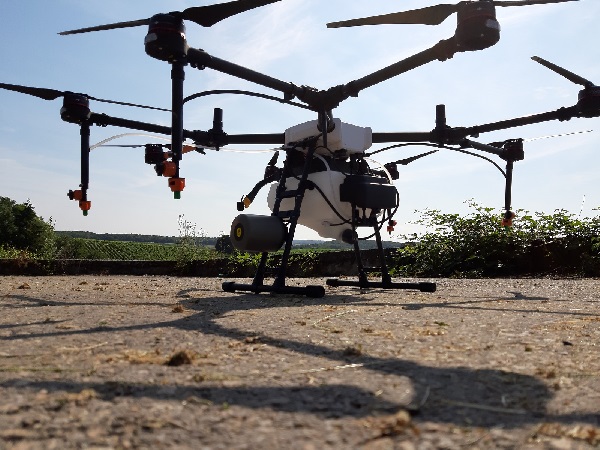 Credit: Domaine L&R Kox
Credit: Domaine L&R Kox
Luxembourg-headquartered Luxaviation Group has launched a pilot project for the spraying of vineyards in the Grand Duchy by means of drones, in cooperation with Domaine L&R Kox of Remich, located in the Mosel wine region.
This new project, initiated by Corinne Kox, a young winemaker with a passion for new technologies applied in viticulture, and run by Luxaviation Drones S.A. (part of Luxaviation Group), has reaffirmed the operator’s commitment to enter the drone market and develop it as an additional business line.
During the second week of July 2019, instructor pilots experienced in aerial spraying successfully flew equipment tests, followed by effective spraying with organic phytosanitary products in vineyards of the Domaine L&R Kox.
Drones are part of a larger trend of data-driven agri- and viticulture and a movement towards higher efficiency and accuracy, reduced erosion, preserving the environment, reducing noise pollution to neighbourhoods and potentially enhancing the quality of the final product.
Corinne Kox of Domaine L&R Kox explained: “The many tests undertaken in research centres on using drones in vineyard treatments show the relevance of the unmanned aircraft as a promising tool in terms of input reduction, accuracy and protection of the soil and the environment. Smarter and more sustainable viticulture will be facilitated as a result of greater flexibility of spraying equipment used and adaptability in treatment schedules”.
Similar to maintaining highest certification standards in the manned fixed and rotary wing business, Luxaviation is engaged in the process to validate operators' procedures and standards to the Light Unmanned Aircraft operator Certificate (LUC) published on 24 May 2019 by the European Union Aviation Safety Agency (EASA) on the rules and procedures for the operation of unmanned aircraft and aims to be the first operator to obtain the certificate.
Luxaviation Group CEO, Patrick Hansen, commented: “Drones can support giving winegrowers a clearer picture of the cultivation and are easier to organise and more affordable than helicopters. Since the pilots can fly the drones closer to the ground, we are able to provide winemakers with greater scheduling flexibility, accuracy and a reduction of noise for the surrounding neighbourhood. By some estimates, winegrowers may be able to reduce spraying, which equates to reduced costs and a lesser environmental impact”.
Since the appearance of fungi on vine varieties at the end of the 19th century, particularly powdery mildew and mildew, winegrowers have had to fight cryptogamic diseases. Curative treatments to prevent the development of the cryptogamic diseases are currently not available. As such, winegrowers are obliged to protect the vines at regular time intervals. The reduction of inputs is a strategic challenge for the entire wine sector in terms of ecology and respect for the environment, brand image and financial costs. Contributions to the reduction of inputs in vine cultivation are made at several levels: the search for varieties more resistant to cryptogamic diseases, as well as the quantity and quality of spraying by influencing the choice of spraying equipment used, the preparation of dilutions or the application conditions.
Subject to additional successful operations over the next weeks, Luxaviation Group is expecting to commercially launch vineyard spraying services globally later in 2019.








